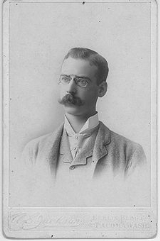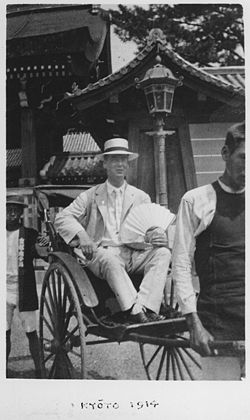
Richard H. Geoghegan
Encyclopedia

Life in England
When he was 3 years old, Richard Geoghegan suffered a fall on the stairs at home, as a result of which he was crippled for life, walking with difficulty and often with the help of a cane. As if in compensation for his physical handicap, from an early age he displayed extraordinary intellectual abilities, especially in the learning of languages. Around the age of 17, he became interested in oriental writing systems and entered the University of OxfordUniversity of Oxford
The University of Oxford is a university located in Oxford, United Kingdom. It is the second-oldest surviving university in the world and the oldest in the English-speaking world. Although its exact date of foundation is unclear, there is evidence of teaching as far back as 1096...
, in January 1884, to study Chinese
Chinese language
The Chinese language is a language or language family consisting of varieties which are mutually intelligible to varying degrees. Originally the indigenous languages spoken by the Han Chinese in China, it forms one of the branches of Sino-Tibetan family of languages...
. There he showed himself to be an outstanding student, twice receiving scholarship awards, but he never obtained a degree. At Oxford, Chinese remained a nondiploma field of study until 1936.
Esperanto activities
In the autumn of 1887, when the language EsperantoEsperanto
is the most widely spoken constructed international auxiliary language. Its name derives from Doktoro Esperanto , the pseudonym under which L. L. Zamenhof published the first book detailing Esperanto, the Unua Libro, in 1887...
had just appeared, Geoghegan read an article about it and immediately wrote to the language's creator, L.L. Zamenhof (in Latin). Zamenhof sent Geoghegan a German edition of his Unua Libro
Unua Libro
The Unua Libro was the first publication to describe the international language Esperanto . It was first published in Russian on July 26, 1887 in Warsaw, by Dr. L.L. Zamenhof, the creator of Esperanto. Over the next few years editions were published in Russian, Hebrew, Polish, French, German,...
(First Book). Having learned the language from this book in short order, a while later Geoghegan received from Zamenhof the first copies of the same book in an English translation by the Warsaw Jew J. St. (pseudonym of Julian Steinhaus). Geoghegan warned Zamenhof that this translation was a mess, and it would only make a laughingstock of Esperanto in the English-speaking world. Subsequently, Zamenhof asked Geoghegan to produce a more suitable translation himself, which he did. The translation by Steinhaus was withdrawn, and in 1889 Geoghegan's was published. In the Unua Adresaro, an early directory of supporters of Esperanto, Geoghegan appears as number 264.
Emigration to Washington State
Richard Geoghegan left Oxford at the end of 1887 and was an instructor of classical languages in LondonLondon
London is the capital city of :England and the :United Kingdom, the largest metropolitan area in the United Kingdom, and the largest urban zone in the European Union by most measures. Located on the River Thames, London has been a major settlement for two millennia, its history going back to its...
until 1891, when he—along with his widowed mother and siblings—emigrated to the village of Eastsound
Eastsound, Washington
Eastsound is an unincorporated community on Orcas Island in San Juan County, Washington, United States.Eastsound is the largest population center on Orcas Island, the second-most populated and physically largest of the San Juan Islands...
in the northwest corner of the United States
United States
The United States of America is a federal constitutional republic comprising fifty states and a federal district...
. Not finding an opportunity to support himself in the fishing/farming economy there, in 1893 he went to Tacoma
Tacoma, Washington
Tacoma is a mid-sized urban port city and the county seat of Pierce County, Washington, United States. The city is on Washington's Puget Sound, southwest of Seattle, northeast of the state capital, Olympia, and northwest of Mount Rainier National Park. The population was 198,397, according to...
, in the state of Washington, where he worked as a stenographer for an Anglican bishop, and later in the same capacity for the English and Japanese consulates.
He founded, together with two or three other linguists, the Washington State Philological Society, and contributed several valuable dissertations to it on the relationship between ancient oriental and American writing systems and on calendar systems. Meanwhile he unsuccessfully sought a position as professor of Chinese language at the University of Washington
University of Washington
University of Washington is a public research university, founded in 1861 in Seattle, Washington, United States. The UW is the largest university in the Northwest and the oldest public university on the West Coast. The university has three campuses, with its largest campus in the University...
in Seattle, and the early days of 1903 he accepted an invitation by the well-known judge James Wickersham
James Wickersham
James Wickersham was a district judge for Alaska, appointed by U.S. President William McKinley to the Third Judicial District in 1900. He resigned his post in 1908 and was subsequently elected as Alaska's delegate to Congress, serving until 1917 and then being re-elected in 1930...
to come to Alaska
Alaska
Alaska is the largest state in the United States by area. It is situated in the northwest extremity of the North American continent, with Canada to the east, the Arctic Ocean to the north, and the Pacific Ocean to the west and south, with Russia further west across the Bering Strait...
as a court stenographer. In 1905 he was elected as the first president of the newly formed American Esperanto Association, but in fact he was unable to preside due to his absence.
Relocation to Alaska
Despite the rigorous climate and rough gold mining environment, the informal Alaskan lifestyle and the opportunity to study firsthand AleutAleut language
Aleut is a language of the Eskimo–Aleut language family. It is the heritage language of the Aleut people living in the Aleutian Islands, Pribilof Islands, and Commander Islands. As of 2007 there were about 150 speakers of Aleut .- Dialects :Aleut is alone with the Eskimo languages in the...
and other native languages of the region appealed to Geoghegan. Except for the year 1905, which he spent in Seattle (where the Seattle Esperanto Society was founded primarily under his influence and that of his friend, William G. Adams), and 1914, when he traveled through the western United States and Japan
Japan
Japan is an island nation in East Asia. Located in the Pacific Ocean, it lies to the east of the Sea of Japan, China, North Korea, South Korea and Russia, stretching from the Sea of Okhotsk in the north to the East China Sea and Taiwan in the south...
, Geoghegan remained a resident of Alaska until his death on October 27, 1943. Because of his physical handicaps, Geoghegan was of a retiring nature and remained single until 1916. In that year, infatuated with Ella Joseph-de-Saccrist, he married her, but only secretly, under the advice of friends, because of racial prejudices that existed at that time: Ella, who came from Martinique
Martinique
Martinique is an island in the eastern Caribbean Sea, with a land area of . Like Guadeloupe, it is an overseas region of France, consisting of a single overseas department. To the northwest lies Dominica, to the south St Lucia, and to the southeast Barbados...
, was known as a black. She died in 1936. (This explains why in many biographies one reads that he never married.)
Geoghegan lived simply, often in primitive log cabins, at various addresses in the city of Fairbanks
Fairbanks, Alaska
Fairbanks is a home rule city in and the borough seat of the Fairbanks North Star Borough in the U.S. state of Alaska.Fairbanks is the largest city in the Interior region of Alaska, and second largest in the state behind Anchorage...
. Many residents didn't even know that their modest neighbor was in fact a renowned philologist who knew a dozen languages, consulted by correspondence with the most famous linguists in the world, and contributed to scholarly journals on language topics. He always remained faithful to Esperanto, to whose Lingva Komitato (Language Committee) he was elected immediately upon its formation in 1905. For him, however, Esperanto was mainly a written language. The first person with whom he actually spoke it was Wilhelm Heinrich Trompeter, who visited him in Eastsound
Eastsound, Washington
Eastsound is an unincorporated community on Orcas Island in San Juan County, Washington, United States.Eastsound is the largest population center on Orcas Island, the second-most populated and physically largest of the San Juan Islands...
in the 1890s. His valuable book collection, including many original letters from Zamenhof and other pioneers, as well as other rare artifacts about little known—mainly oriental—languages, were destroyed when the family home in Eastsound burned down in 1906. Probably Geoghegan's most noteworthy linguistic contribution was the compilation of a dictionary and grammar for the Aleut language
Aleut language
Aleut is a language of the Eskimo–Aleut language family. It is the heritage language of the Aleut people living in the Aleutian Islands, Pribilof Islands, and Commander Islands. As of 2007 there were about 150 speakers of Aleut .- Dialects :Aleut is alone with the Eskimo languages in the...
of the Alaskan islands, on which he labored from the time of his arrival in Valdez
Valdez, Alaska
Valdez is a city in Valdez-Cordova Census Area in the U.S. state of Alaska. According to 2005 Census Bureau estimates, the population of the city is 4,020. The city is one of the most important ports in Alaska. The port of Valdez was named in 1790 after the Spanish naval officer Antonio Valdés y...
, Alaska, en 1903. It was finally published only after his death, in 1944, and remains even today the principal English language work on the subject.
In and about Esperanto
About the Aleut language and other topics
Published posthumously.Geoghegan also compiled the foreign language sections (mostly Russian) of:
The letters, diaries, and other papers of Richard Geoghegan are in the Richard Geoghegan Collection, Rasmuson Library, University of Alaska, Fairbanks.

